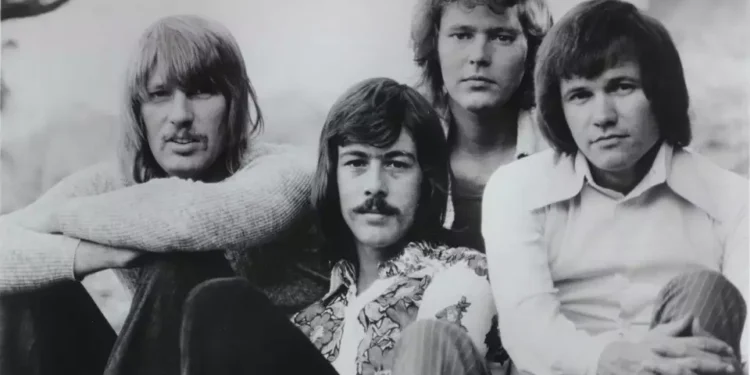
Listening to Bread, featuring Larry Knechtel, from left, Mike Botts, James Griffin and David Gates, is one of columnist Andrew Dansby’s guilty pleasures.
Since I’m the kind of person who spends money better suited for my child’s college education on records, I’m sometimes afforded the opportunity to play those records in public. One could call it DJing, though I think that does a disservice to people who spin records for a living. I don’t get paid for these gigs, including the one set for 5:30 p.m. Wednesday, Sept. 11 at Sundown at the Grove at Discovery Green. I just play a bunch of songs I like and hope they hold together in some ramshackle manner.
I tend to start with one of my two favorite types of music: ’60s Southern soul or ’60s country music. Inevitably the tunes drift toward Tommy Tutone and Phil Collins, which represent one portion of my ’80s. But I was also a child of the do-it-yourself strand of ’80s underground rock that begat serious ’90s alternative rock. My musical skull hardened when there was a clear delineation between what was perceived as credible and not. Crossover successes like Nirvana occurred. But there wasn’t wiggle room to enjoy anything perceived as commercial, which seemed gauche. Music was serious business. “Our band could be your life,” sang D. Boon, late frontman for the beloved independent rock band the Minutemen. “Punk rock changed our lives.”
Emile Hirsch and Paul Rudd in PRINCE AVALANCHE, a Magnolia Pictures release. Photo courtesy of Magnolia Pictures.
Perhaps the bang that ended Nirvana changed this attitude. Or maybe that raw earnestness just played itself out. Snobbery can be a formidable anvil to drag around. But something happened during the past 20 years. Duran Duran – as emblematic of the excesses of ’80s pop as any band – cycled back into vogue. Hall & Oates’ “You Make My Dreams Come True” was the soundtrack to a showstopping scene in a popular independent film. Bruce Springsteen built a song, “Radio Nowhere,” on a lick that sounded an awful lot like the one on Tommy Tutone’s “867-5309/Jenny.”
Irony can be a heavier anvil than snobbery. But I’m skeptical that a bright-eyed appreciation for things that are deemed un-hip by culture police has to be hidden behind a wink. The phrase “guilty pleasure” still gets kicked around, but it doesn’t carry the stigma it once did. “Guilty pleasure” was once a buffer – a way to express affinity for a song without truly committing to it. It was a gutless way to hedge a bet. But we have moved past that concept. When I asked Wayne Coyne, frontman for the arty rock band the Flaming Lips, what his favorite album was, he said it was the soundtrack to “The Wizard of Oz.” Not only was his love for the album sincere, but it also offered insight into the carnival-like music made by his band.
I like Bread. Always have. A friend swears it’s because I didn’t have to live through Bread, and the band’s music served one purpose in its day and that was helping guys seal the deal, for lack of a more elegant phrase.
Bread is an easy target. Perhaps Bread was a poor choice of name; maybe White and Flavorless was already taken. But the natural simplicity of Bread’s songs resonates with me, even when the lyrics teeter toward comical. There’s really no defense for “Baby, I’m-a want you.”
Earlier this year Jason Molina – the singer, songwriter and guitarist in the roots-rock band Magnolia Electric Company – died at 39. He suffered organ failure caused by alcoholism. I went back and found an interview I’d done with him years earlier. I’d forgotten he brought up Bread.
“Bread has written some of the saddest and best songs I’ve ever heard,” he said. “It’s not right there on the surface with that band, but really there are some really tough relationship songs in there.”
And I remembered Mark Linkous, another musician whose band, Sparklehorse, enjoyed better reviews than sales, who described going “on a Bread kick” and playing “Everything I Own” from time to time in his shows. Linkous shot and killed himself in 2010 at age 47.
So two musicians with credibility to spare – both depressed, both resolute in their self-destruction – found some melancholic beauty in the music of a band that has for decades been a punch line for people with supposedly more refined musical taste.
I enjoy the thoughtful, visceral music made by the Arcade Fire – perhaps the most successful contemporary alternative rock act working today, with admirable album sales and reviews. Its music is intelligent while also rousing and singable. Yet to my ears the band still hasn’t recorded anything as memorable or as catchy as “Everything I Own,” a simple, endlessly melodic song about longing.
Once was the time I’d hide albums by Bread or Cat Stevens in the locked drawer of a dormitory desk.
But today, unburdened by matters of taste, I find more joy in playing them in public and finding others who share their charms.
Andrew Dansby covers culture and entertainment, both local and national, for the Houston Chronicle. He came to the Chronicle in 2004 from Rolling Stone, where he spent five years writing about music. He’d previously spent five years in book publishing, working with George R.R. Martin’s editor on the first two books in the series that would become TV’s “Game of Thrones. He misspent a year in the film industry, involved in three “major” motion pictures you’ve never seen. He’s written for Rolling Stone, American Songwriter, Texas Music, Playboy and other publications.
Andrew dislikes monkeys, dolphins and the outdoors.

